Driven by passion, young vet travels across Indonesia to rescue large marine animals
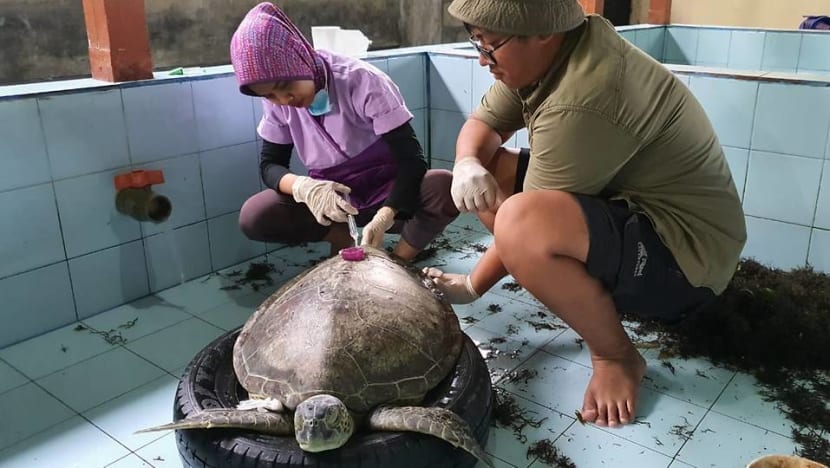
Members of IAM Flying Vet tend to a weak sea turtle which had digested plastic. (Photo courtesy of IAM Flying Vet)
JAKARTA: It was midnight when Ida Ayu Dian Kusuma Dewi and her husband, both veterinarians, rushed to an animal lab in southern Bali.
They were informed that a turtle conservation group had just sent an injured sea turtle over from northern Bali, which was a four-hour drive away. It was bleeding excessively after being hit by a propeller.
The couple ended up performing surgery on the turtle until 3am in the late 2018 incident.
“It was something nice to remember because I have never performed a surgery on a sea turtle before.
“The turtle was really strong, it was fidgeting as if to say ‘Ah, don’t do anything to me, leave me alone,’” the 28-year-old told CNA.
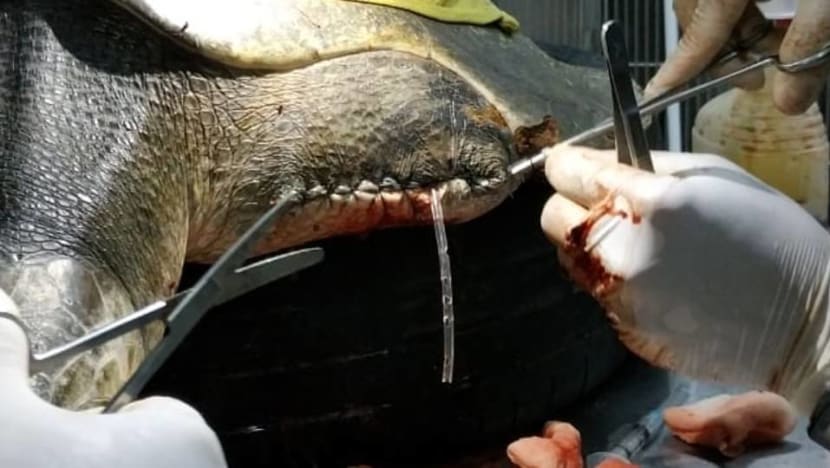
Dewi and her husband were ecstatic when they managed to save the turtle. It recuperated at a conservation centre for several months before it was released back to the ocean.
As members of IAM (Indonesia Aquatic Megafauna) Flying Vet, an association of Indonesian veterinarians focusing on marine animals, it is their duty to handle sick or stranded aquatic animals whether alive or dead throughout Indonesia.
The organisation was founded in May 2018 and has so far handled over 250 animals, mostly sea turtles, whales, dugongs and dolphins.
The 30 volunteer vets spread all over Indonesia are expected to jump into action anytime their expertise is needed.
Dewi, the coordinator of the group, said the male turtle they rescued was actually found together with a female by the locals.
“I think they were mating when they both got hit by the propeller. The male one injured its left flipper, but the female died because of excessive bleeding,” she recalled.
READ: Love for ocean motivates Indonesian diver to clean up marine debris
LOVE FOR MARINE LIFE DEVELOPED DURING UNIVERSITY DAYS
There are not many aquatic megafauna vets in the archipelagic nation, an irony since it is a maritime country, Dewi said.
Few universities in the country have programmes on marine animals, she added, as most veterinary science in Indonesia focuses on livestock and pets.
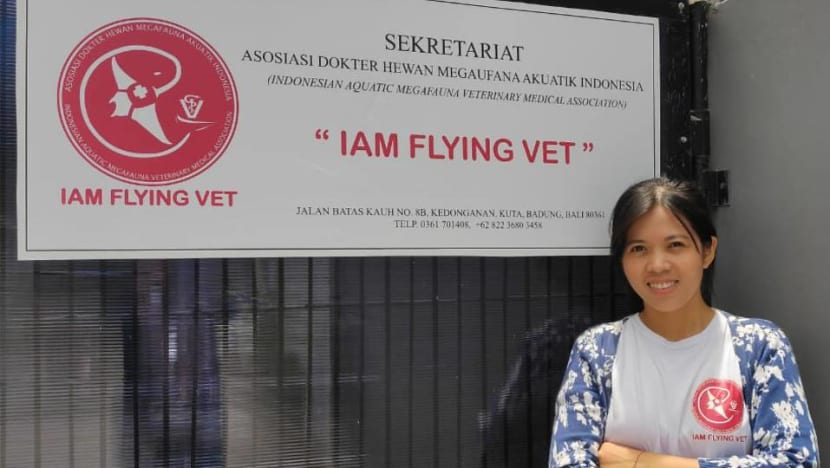
Dewi’s love for marine animals, and sea turtles in particular, grew when she was studying at the University of Udayana in Denpasar, Bali.
Although she is a native Balinese, Dewi was born and raised in Mataram city on neighbouring Lombok island.
It was during her university days when her uncle, who was also her lecturer, introduced her to sea turtles and marine life.
READ: 'My house is full of garbage': In West Java, imported waste worsens living conditions of villagers
She later pursued a master’s degree at the University of Queensland in Australia to widen her horizon.
In 2018, her seniors from University of Udayana invited her to join IAM Flying Vet, which operates under the Indonesian Veterinary Medical Association.
“There are many cases of stranded (marine) animals which do not receive medical help,” Dewi said of the idea behind establishing the group.
Working closely with the Ministry of Maritime Affairs and Fishery as well as other authorities and green groups, IAM Flying Vet is reliant on first responders who tip them off about stranded animals.
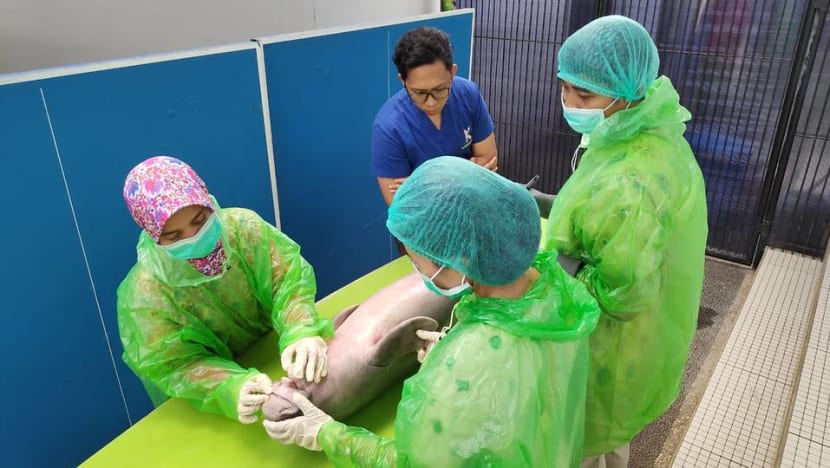
Sometimes they also discover cases being discussed on social media, and it is Dewi’s job as a coordinator to decide which vet to be deployed.
Being self-funded, financial constraint can be a challenge. The group accepts donations in the form of accommodation or travel tickets, but prefers not to accept money.
Dewi remained as a member of IAM Flying Vet while she took up a job as a research assistant at the University of Tennessee in the United States about eight months ago.
Due to the COVID-19 pandemic, she is now back in Denpasar and working from home.
READ: Pandemic offers scientists unprecedented chance to 'hear' oceans as they once were
PERFORMING A NECROPSY ON BABY DUGONG
Not every mission of IAM Flying Vet is about rescuing animals. Sometimes Dewi is required to perform necropsies on dead marine animals to determine the cause of death.
One of her memorable experiences was when she had to fly from Bali last year to tourism hotspot Raja Ampat in West Papua province to perform a necropsy on a dead baby dugong.
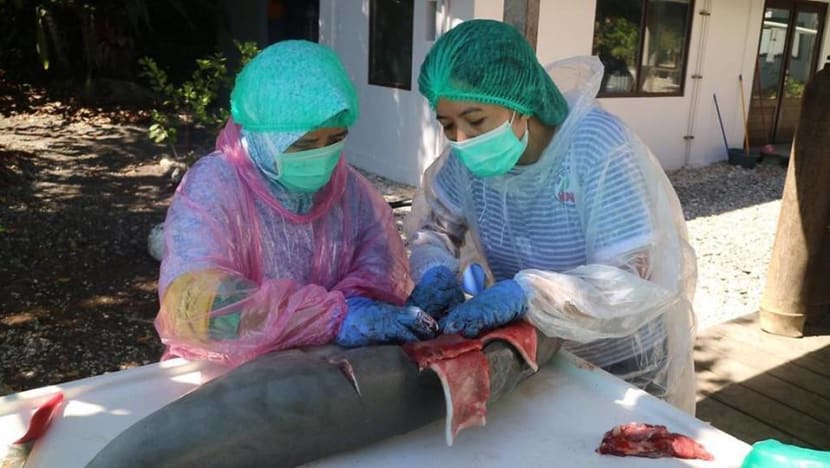
The flight took four hours and from Sorong city, she had to wait for another day to take a boat to reach the island.
The baby dugong was stranded on a resort beach and was then being taken care of by locals and a Papua-based volunteer of IAM Flying Vet.
The locals bought a lot of supplies such as milk and vitamins from the city for the baby dugong, but despite their good intention, it died a few weeks later.
“The people who had been feeding the baby dugong were really emotional when they knew the baby dugong could not make it.
"Everyone was really sad, and they cried. They couldn’t bear to witness the necropsy."
Baby dugongs usually get separated from their mothers when there is presence of boats, excessive noise or other disturbance where they swim, Dewi said.
“It’s really hard to take care of a baby dugong. Its survival rate is very low because it is really prone to stress, and people need to feed it every three hours. It is just like nurturing a baby.”
READ: Trash for gold - Jakarta’s waste bank rewards residents for trading in recyclables
The necropsy did not provide a clear clue besides mild inflammation in the stomach, thus stress was assumed to have played a part.
Dewi said that many necropsies are inconclusive, but for stranded baby or infant animals, they usually die because they do not have a good immune system or are far from their habitat.
MANY STRANDED ANIMALS FOUND TO HAVE SWALLOWED PLASTIC
With Indonesia being the world’s second-biggest ocean polluter after China, there have been many cases of the volunteers having to deal with animals that have consumed plastic.
“The latest case we got here in Bali was a huge adult turtle found floating in the southern Bali waters.
“It was brought to the turtle center in Serangan. The vet treated it and eventually the sea turtle defecated plastic. It was really terrible,” Dewi said.
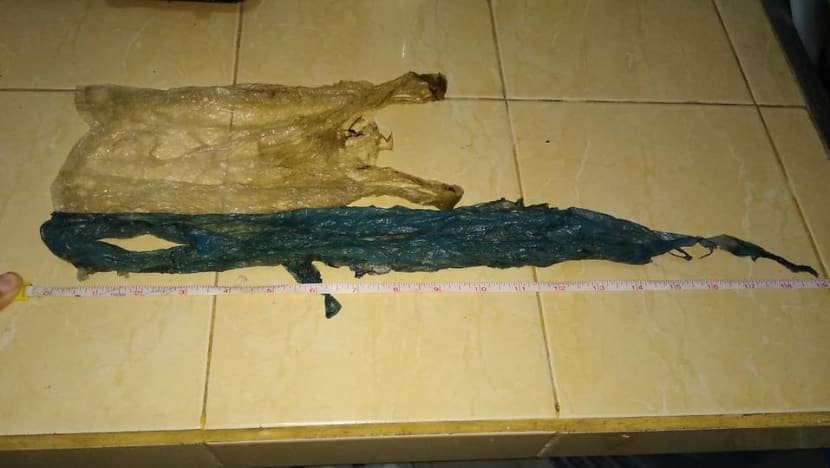
It took two months for the plastic to reach the very end of the turtle's intestine, she added.
IAM Flying Vet has also come across stranded whales that were later found to have swallowed kilograms of plastic.
LESS STRANDED ANIMALS DURING COVID-19 PANDEMIC
As marine animals typically contain lots of bacteria, IAM Flying Vet is trying to educate people not to touch them as it could lead to zoonosis, an infectious disease transmitted from animals to humans.
Dewi revealed that it can also be tricky when the volunteers encounter huge dead animals as they do not have the equipment to perform a necropsy, and the animals are too big to be buried.
They have to cut the animals into pieces before they bury them.
Besides rescuing aquatic megafauna, Dewi is also passionate about spreading awareness on conserving marine animals.
READ: ‘I cried every day’ - Why Singapore’s vets might be depressed
She said sea turtle smuggling, for instance, is common across Indonesia.
In Bali, locals are known to practise many unique traditional rituals, one of them involves sea turtles, she added. These have threatened the existence of the species.
Human activities such as overfishing, fish bombing and overcrowded beaches are known to be the main causes of aquatic megafauna getting stranded, Dewi said.
“Everything related to humans basically (is the cause of animals being stranded), not much about naturally occurring disease, this is very clear."
Usually, IAM Flying Vets receives up to five reports a month about stranded marine animals across Indonesia.
In the past few months, fewer reports were lodged. The group believed this is due to the fact that there is less human activity in the ocean and beaches, as people stay home to avoid COVID-19 infection, Dewi said.
“Someone has to unveil the mystery as to why these animals get stranded on beaches.
“The cases bring a message to us, telling us that something is not right. For example, if they are stranded because they have consumed plastic, it could be an indication that there is too much plastic in the ocean, and people need to do something about it,” Dewi said.














